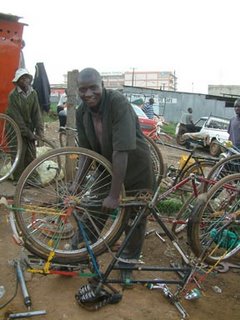Koinonia- Not all Greek to them!

‘Koinonia’- is a Greek word meaning ‘together in partnership’; a word which Ben Ogunyo best thought captured the essence of his work, when he set up Koinonia four years ago. Together with his long-term friend George Ngesa, he is turning on its head the way homelessness among children is being dealt with in the region. Rather than placing children in residential homes, Koinonia works with families and reintegrates the kids, some as young as ten, with their relatives.
It can be a slow process, taking time to build trust among the children and families, but as Ben emphasised, it is working at the root of the problem. If children run away from home there is an obvious problem there, and it is in the home where the real solution to the problem lies.
Ben and George meet with families over and over, gradually building trust, and slowly the real issue of why the child left home in the first place emerges. The father may be drinking, the mother may be home brewing, the family may have five, ten or twelve children- and just do not have the resources to support them all. Even though primary schooling is free in Kenya, there are a lot of hidden costs. Uniforms, books and school meals can cost up to KSh 2000 (about €25); multiply that by the number of children in a family and you get an exorbitant, prohibitive figure.
Ben and George identify kids on the streets, or the kids themselves approach them. Many want a way out, but just do not know what doors to knock on. Life on the streets is a rough ride. The kids survive on slim pickings- scavenging, odd jobs, begging, crime. The life of drugs can suck them in- glue sniffing is rampant among the street population, up to 2,000 children and teenagers in Eldoret town alone. Glue cost about 5 shillings, an attainable amount. It is bought from cobblers, who despite legislation, which bans them from selling it to under-aged people, is not reinforced. Walking past the area in Eldoret where the kids conjugate (on an urban dump), I see the empty bottles and them some kids sniffing- it is an open habit; who have they to hide from I ask myself? Heroine is on its way too, smuggled in over the borders with Tanzania, often by the street kids themselves. Pushers apparently prefer them, as they look more innocent. But Koinonia is finding ways to break the cycle for these kids.
If a family (whether the parent, uncle or other relative) agrees to take the child back into the home, Koinonia agrees to assist with school costs. They then work with the family, and discuss ways of generating income with in the family. They may link them with micro-finance institutions, and discuss how they manage their farm. This method is a lot more cost effective than institutional housing for children.
In cases where the children can not attend school, Koinonia links them up with vocational training- bike repairs, auto mechanics, tailoring, so that they can in turn set up their own small businesses. George walked me around town and introduced me to some of the boys they were working with, and who are now successfully trained and off the streets. I met Martin, 22, who was on the streets for a few years. He now runs a bike repair shop, is married and has a young family of his own.
I also met Hassan (on the streets from the age of five), and Erastus, both were being trained by a lovely woman called Lina, who owns a bike shop. She trains them to fix the bikes and they in return get some work. I asked Erastus about how different his life is now, and he simply beamed a smile, turned to George, and thanked him for the opportunity.



0 Comments:
Post a Comment
<< Home